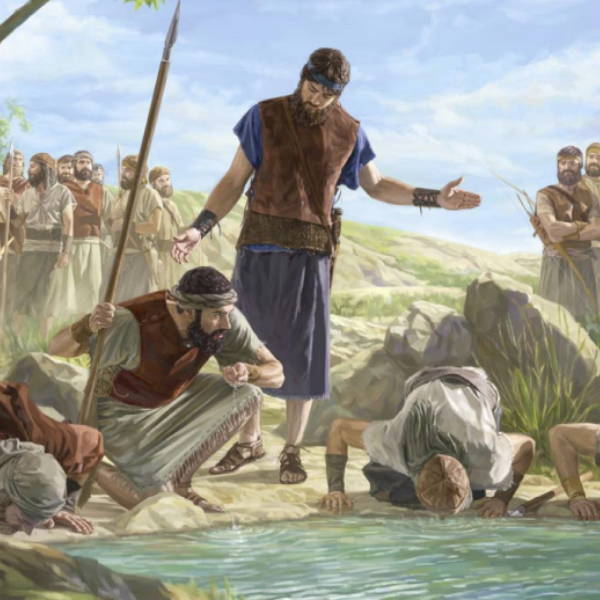More than 11 years revealing secrets because there is no excuse for secrecy in religion – w1997 June 1; Dan 2:47; Matt 10:26; Mark 4:22; Luke 12:2; Acts 4:19, 20.

My bible book of bible Stories for Children, on the historical narrative of Gideon’s 300 soldiers
Written and Published by: Miss Usato, October 8th, 2025
In a Jehovah’s Witness children’s book, “My Book of Bible Stories,” There is a biblical story the organization narrates about Gideon’s soldiers drinking from a nearby stream before combat. The message they broadcast is about being alert, obedient, and having full trust in Jehovah. But what does it mean to be alert? To be aware, or to be blind to your surroundings? I’m going to show you the comparison of their teachings and the reality of what it really means to be aware and obedient at the same time.
Gideon and his 300 dedicated soldiers
In the New World Translation of the Holy Scriptures, Judges chapter 7:4-7 is about Gideon’s army being put to a test. Thousands of men gathered to fight Midian, but Jehovah drastically reduced the number. At a stream, most of the soldiers dropped to their knees and buried their faces in the water. Only three hundred stayed upright, scooping water with their hands so they could drink while still scanning the horizon. Those few alert, watchful men were the ones Jehovah chose to bring victory. * Interesting that Gideon was able to spot 300 men out of the thousands, 10,000 men to be scripturally accurate, drinking water out of the stream.*
In the 1950s, this biblical story began to appear in various Watchtower articles. For example, a 1968 Watchtower article titled “Gideon—Modest and Valiant Fighter for Jehovah” highlights how Gideon, initially hesitant and self-doubting, demonstrated unwavering faith in God’s guidance on initiating the test to his soldiers. Despite his initial reluctance, Gideon followed God’s instructions precisely, leading to a victory over the Midianites.
This account serves as an example for Jehovah’s Witnesses, illustrating the virtues of humility, trust in divine direction, and the strength found in obedience to God’s will… while also staying alert to your surroundings in life, right?
However, what is more well-known to Jehovah’s Witnesses is the depiction of Gideon and his soldiers read to millions of Jehovah’s Witness children, typically at bedtime (depiction in cover photo shown above) from “My Book of Bible Stories” published in 1983, which consists of 116 bible stories.
Honestly, I don’t think this story should have been presented as a lesson for Jehovah’s Witnesses, because it conveys the very opposite of what the Organization wants from its members. blind faith, control, and unquestioning guidance.
The Stories’ messages, according to the Governing Body, and the reality of it
In an article “Elders- Learn from Gideons’ Example” -Watchtower June 2023 –They express how elders must be ready to obey, even when a new direction seems difficult or the task is daunting.
Quote: Elders should be “ready to obey.” An obedient elder readily submits to what the Scriptures say and to direction from God’s organization.”
-Another quote
“-Elders today imitate Gideon by implementing recommended changes in theocratic direction.
As an example, in 2014, the Governing Body changed the way Kingdom Hall and Assembly Hall construction projects are financed. (2 Cor. 8:12-14) Congregations would no longer repay a loan. Instead, congregations worldwide would pool their resources so that theocratic facilities could be constructed wherever they were needed, regardless of the local congregation’s ability to pay.”
Alertness vs. Blind Obedience
Bible Story: Judges 7:5–7 – The 300 men stayed upright while drinking, scanning their surroundings. Their alertness made them chosen by Jehovah.
The Teaching: Direct parallels drawn are that elders must be ready to obey, even when a new direction seems difficult or the task is confusing. Their obedience is not only consistently tested but also heavily guided by their rule book, “Shepherd the Flock of God.”
The Contrast: Gideon’s soldiers succeeded because they stayed aware and responsive; Jehovah’s Witnesses are encouraged to obey even without critically assessing circumstances. Is their “alertness” defined as blind obedience and investigating possible sinful matters, diving into others’ personal lives?

Local Awareness vs. Centralized Control
The Bible Story: The 300 assessed their immediate environment, aware of potential threats.
The Practice: Shown in the quote above, in 2014, the pooling of funds for Kingdom Hall construction was made, decided by the Governing Body as the best choice, guided by God, of course.
The Contrast: Gideon’s Soldiers could act where they were; some didn’t look around, some did. This determined their fate. Jehovah’s Witnesses must defer to the central authority and cannot direct resources according to local needs. The pooling of funds for Kingdom Hall construction in 2014 centralized money, giving the Governing Body tighter control over large sums and highlighting the organization’s growing wealth. By moving funds out of local congregations and into a global pool, the organization is more like a wealthy institution managing significant assets.
Individual Responsibility vs. Organizational Direction
The Bible Story: Each soldier’s vigilance mattered, and personal awareness was critical to success.
The Teaching: Elders and members are taught to comply fully with organizational direction.
The Contrast: Gideon’s men were rewarded for taking personal responsibility in their vigilance; modern Jehovah’s Witnesses are rewarded for obedience, not independent assessment.
What the Organization teaches
The main lesson Speakers and articles usually focus on a cluster of themes:
The awareness of hypocrisy in plain sight

The way the Governing Body presents this lesson to Jehovah’s Witnesses, in my opinion, is deeply hypocritical. While Gideon’s men were rewarded for looking around, thinking, and staying aware of their environment, Jehovah’s Witnesses are repeatedly instructed not to “look around” or consider outside information, whether as elders or regular members.
On JW broadcasting, Gajus Glockenti talked about “Protecting Yourself From Lies.” He goes into a wordy description about what lies are, how to spot them, and what to really trust. He states that you should have absolute trust in Jehovah and the Governing Body, and that lies and misinformation are simply a sign of the last days. Off Quote: “If the information is not from the Organization, you need to keep an open mind that this may be fake news.”
Apostates defined by Jehovah’s Witnesses are the ones who spread mistruths, when really they symbolize critical thinking, personal awareness, and looking up, making sure they keep on the watch.
Honesty, according to the scriptures, before the Witnesses apply their versions of it, Apostates are more like Gideon’s 300 soldiers than Jehovah’s Witnesses are.